 ★★★★★
★★★★★
“Dark Angel.”
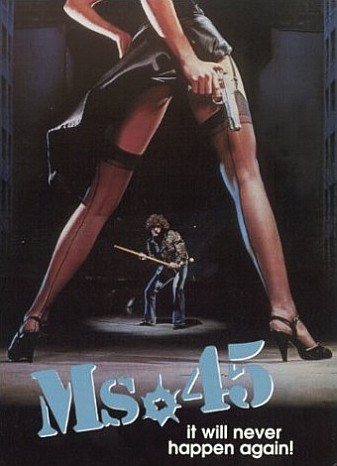
 Abel Ferrara is one of the most interesting of American film-makers, with an uncompromising vision that has seen him almost entirely shut out of mainstream cinema: the closest he’s come to a Hollywood movie was his Invasion of the Body-Snatchers remake, which was a failure on just about every level. Instead, he’s been on the outside, looking in, with films that range from the brilliant to the near-unwatchable. You never know what you’re going to get. It can be something raw and amazing, like Bad Lieutenant, or it can be a garbled, self-indulgent mess, such as his attempt to adapt William Gibson’s New Rose Hotel.
Abel Ferrara is one of the most interesting of American film-makers, with an uncompromising vision that has seen him almost entirely shut out of mainstream cinema: the closest he’s come to a Hollywood movie was his Invasion of the Body-Snatchers remake, which was a failure on just about every level. Instead, he’s been on the outside, looking in, with films that range from the brilliant to the near-unwatchable. You never know what you’re going to get. It can be something raw and amazing, like Bad Lieutenant, or it can be a garbled, self-indulgent mess, such as his attempt to adapt William Gibson’s New Rose Hotel.
Ms. 45 falls firmly into the first category, held together by an amazing, luminescent performance from the then 17-year old Zoe Tamerlis [a.k.a. Zoe Lund], whose character Thana is entirely mute – except for one word, whispered in the final scene. She works in a garment factory, run by sleazy owner Albert (Sinkys): one day, she is raped on the way home. Worse follows, as when she stumbles in to her apartment, another intruder is there, and violates her again. However, with the aid of a convenient domestic appliance, she kills him – and now possesses his gun, with which she can take on, single-handed, the men she now perceives as threats.
As Thana’s mental state disintegrates, however, her action gradually shift away from justified. While the viewer initially sympathizes with her, and cheers her on, it slowly becomes apparent that she has become entirely unhinged, paranoid and delusional. She goes from reaction to pro-action, dressing up and going out with the specific intent of luring men in and killing them. In many ways, Thana ends up worse than those who triggered her rage, spiralling down into what are basically random acts of violence: Tamerlis had, allegedly, been a victim of rape the previous year by a professor at Mount Holyoke College, and did not report it. As Ferrara put it, “Women are brought up in a male dominated society. You’re being raped every day, one way or another. That is the metaphor of the film.”
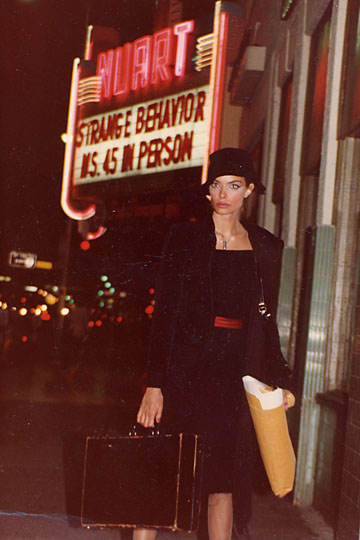 Hmm. While I can acknowledge the political subtext in Thana’s muteness [especially since it appears largely to be psychological, going by the last scene], I’m not quite sure how seriously I take this claim overall, given Ferrara actually plays one of the rapists, and a large percentage of the time is spent objectifying and fetishizing his lead actress, to the extent where Chris felt she looked like a supporting actress in a Robert Palmer video. Perhaps the most memorably instance of this is Thana, dressing up as a nun – but one that also wears stocking and suspenders – before heading out to a Halloween party. With her blood-red lipstick, she kisses each of the bullets before loading them into her gun, a sequence which tells us much about Ferrara’s repressed Catholicism [also apparently rampant in Lieutenant, where both Ferrara and Lund worked on the script], as well as paying homage to the other great New York street-sweeper, Travis Bickle from Taxi Driver.
Hmm. While I can acknowledge the political subtext in Thana’s muteness [especially since it appears largely to be psychological, going by the last scene], I’m not quite sure how seriously I take this claim overall, given Ferrara actually plays one of the rapists, and a large percentage of the time is spent objectifying and fetishizing his lead actress, to the extent where Chris felt she looked like a supporting actress in a Robert Palmer video. Perhaps the most memorably instance of this is Thana, dressing up as a nun – but one that also wears stocking and suspenders – before heading out to a Halloween party. With her blood-red lipstick, she kisses each of the bullets before loading them into her gun, a sequence which tells us much about Ferrara’s repressed Catholicism [also apparently rampant in Lieutenant, where both Ferrara and Lund worked on the script], as well as paying homage to the other great New York street-sweeper, Travis Bickle from Taxi Driver.
Certainly, Tamerlis’s reading of the film is rather different. [Spoiler alert] “No, Ms. 45 is not about women’s liberation, any more than it is about mutes’ liberation, or garment workers’ liberation, or your liberation, or my own. Notice that her climactic victim is not a rapist in the clinical sense. He is her boss. The real rapist. Our real rapist… Ms. 45 presents a humble, yet well-crafted metaphor for rebellion of the any-sexed oppressed. But the gun was put in a woman’s hand. A woman carried that universal message, and so it was all the more powerful. It made us shiver. Male and female. Different timbres and temperatures of shiver, but shiver all round.”
Running counter to that, or perhaps lending it an additional depth, is that the one who stops Thana, in effect betraying her, is one of her own. It’s a woman and a fellow garment worker, her former friend Laurie (Stuto), who stabs her in the back, literally – a metaphor that I’m certain was not accidental, any more than the phallic positioning of the knife at Laurie’s crotch. [End spoilers] The subtext there seems to be that the oppressed can not be trusted to stick together in their battle against the oppressor, even though Laurie is a strong-enough personality in her own way. She certainly has no problem responding in kind to the barrage of verbal harrassment she and Thana suffer as they walk home from work. Our heroine, meanwhile, has ‘victim’ written all over her in the early stages of the film, though the strength she eventually finds and displays, is clearly in a radically different and anti-social direction.
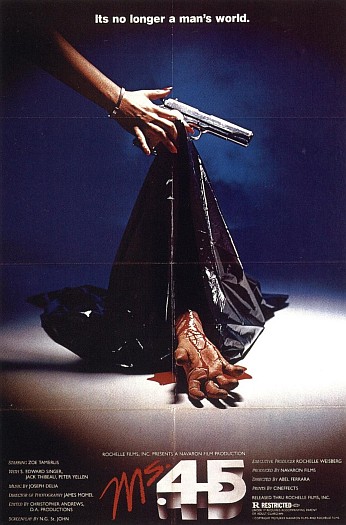 There are certainly holes in the plot logic. Where is Thana getting all the bullets from, and why is she such a crack-shot, despite presumably having never having handled a gun before? Yet these are in step with the pitch-black tongue-in-cheek humour the film contains: witness the long, rambling monologue inflicted on Thana by a guy she meets in a bar [her muteness making her the ultimate good listener]. I laughed like a drain at the sequence where Thana tries to get her landlady’s dog run over in traffic, as its nosiness concerning the severed body-parts round her appartment poses a threat. And when disposing of said parts, there’s surely nothing that you want to hear less, than for someone to shout after you, “Hey, lady! You dropped your bag!”
There are certainly holes in the plot logic. Where is Thana getting all the bullets from, and why is she such a crack-shot, despite presumably having never having handled a gun before? Yet these are in step with the pitch-black tongue-in-cheek humour the film contains: witness the long, rambling monologue inflicted on Thana by a guy she meets in a bar [her muteness making her the ultimate good listener]. I laughed like a drain at the sequence where Thana tries to get her landlady’s dog run over in traffic, as its nosiness concerning the severed body-parts round her appartment poses a threat. And when disposing of said parts, there’s surely nothing that you want to hear less, than for someone to shout after you, “Hey, lady! You dropped your bag!”
Chris, who lived in the Big Apple during the early-80’s, can also attest to the attitudes and dialogue as being authentic Noo Yawk, and the film does an excellent job of portraying the city as a predatory jungle, with a threat lurking behind every corner, especially for someone as attractive as Thana. Of course, “threat” is relative, and by the end, our heroine is the biggest threat – albeit only to those with a Y-chromosome, and the question of whether they deserve it or not is, to some degree, debatable. Still, in the words of the great philosophers, Paul Cook, Steve Jones and Ronny Biggs, “No-one is innocent.” Particularly in these days of movies produced by bean-counters, it’s refreshing to see a film that eschews a black-and-white approach in favor of an arc that takes us with a character as they journey into somewhere very dark and unpleasant, without needing to resolve things in a manner best described as, “…and they all lived happily ever after.”
[The pics and quotes here largely come from zoelund.com, a tribute site apparently run by Zoe’s ex-husband.]
Random notes
- Tamerlis used to show up to some screenings of the film [above, outside the Nuart theater in Los Angeles] and discuss the social and political implications of the movie afterwards with the audience.
- Which must have been interesting, as even the grindhouse theaters that were the movie’s natural home found it difficult viewing. In Cult Movies 2, Danny Peary says of the film, “Never has a 42nd Street theater been so quiet and disciplined as when Thana went through her rounds and murdered every offensive male who crossed her path… Unexpectedly, the men who had whooped all through Amin and the obscenely gory previews of Dr. Butcher, whimpered worrisomely “Oh, my God” and slumped in their seats and shut up.”
- It’s still unavailable in the United Kingdom except in a version where the rape scenes are cut by one minute, 42 seconds. Even the 2000 US DVD was re-edited: the cuts include changes to the first rape featuring Ferrara’s cameo, which is split by an insert shot from a later scene, the second rape omits a line “This oughta make you talk, huh?” and the climatic shoot-out removes an on-screen murder, which now occurs off-screen.
- The film inspired a song by L7, with the same title: “She’s got a gun, just make her day: don’t fuck with her, she’ll blow you away. She walks the streets at night and they think she is a whore. She’s gotta deal with you – she’s gonna even out the score.” The less well-known Dandi Wind also wrote a song called Ms. 45: “Today I bought a gun, Now I’m dressed just like a nun.”
- “According to Tamerlis, her performance in Angel of Vengeance provoked a sniper attack on her in New York, wounding her.” — 1983 Virgin Film Yearbook
- While Tamerlis experienced some success as a screenwriter and actress [Larry Cohen’s Special Effects is certainly worth checking out], she was a long-time drug user first of heroin and then cocaine. This contributed to her death of heart failure in Paris, in 1999.
Dir: Abel Ferrara
Stars: Zoe Tamerlis, Albert Sinkys, Darlene Stuto, Helen McGara
a.k.a. Angel of Vengeance





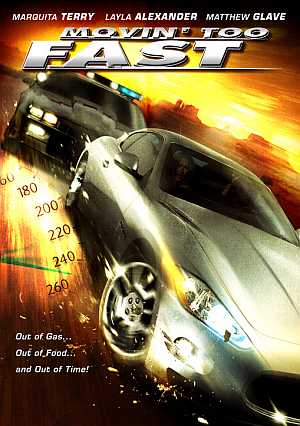 Yes, while there may not be a lot new here, the combination is at least somewhat interesting, and it’s put together solidly enough. Two students, Nina (Alexander) and Melissa (Terry) are on a cross-country drive, when they get stopped for speeding. Melissa makes a pass at the cop, but it’s an encounter that goes badly wrong, and she ends up beating him up with his own night-stick. When the duo get back on the road however, they find themselves being pursued by a police-car, which clearly has very bad intentions: with gas running low and – inevitably – no cellphone service to be found, can they survive?
Yes, while there may not be a lot new here, the combination is at least somewhat interesting, and it’s put together solidly enough. Two students, Nina (Alexander) and Melissa (Terry) are on a cross-country drive, when they get stopped for speeding. Melissa makes a pass at the cop, but it’s an encounter that goes badly wrong, and she ends up beating him up with his own night-stick. When the duo get back on the road however, they find themselves being pursued by a police-car, which clearly has very bad intentions: with gas running low and – inevitably – no cellphone service to be found, can they survive?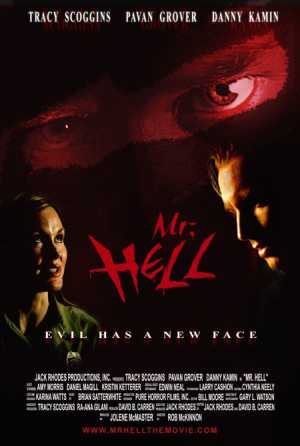 Sometimes, you just have to sit back and let the DVD sleeve do the talking. “The notorious serial killer, Harry Eugene Loveless AKA Mr. HELL roamed from town-to-town and job-to-job, brutally murdering his victims, with the demonic intention of removing the ‘windows to the soul’ – their eyes! Mr. HELL mutilated Dr. Karl Matthews at a government laboratory where biological weapons were secretly being developed. The daughter’s precocious daughter, Tyler, who discovered her father’s body with his eyes missing, was then pursued by Harry through the lab’s subterranean tunnels. During the chase, Harry was accidentally destroyed by toxic industrial acid, and his remains flowed into a storage container. Was this the end for Mr. HELL?
Sometimes, you just have to sit back and let the DVD sleeve do the talking. “The notorious serial killer, Harry Eugene Loveless AKA Mr. HELL roamed from town-to-town and job-to-job, brutally murdering his victims, with the demonic intention of removing the ‘windows to the soul’ – their eyes! Mr. HELL mutilated Dr. Karl Matthews at a government laboratory where biological weapons were secretly being developed. The daughter’s precocious daughter, Tyler, who discovered her father’s body with his eyes missing, was then pursued by Harry through the lab’s subterranean tunnels. During the chase, Harry was accidentally destroyed by toxic industrial acid, and his remains flowed into a storage container. Was this the end for Mr. HELL?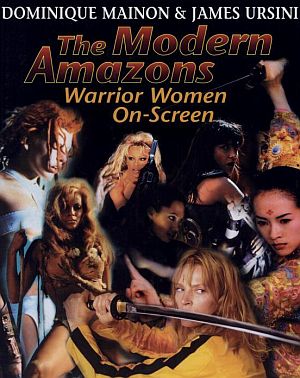 While it’s nice to see our favourite topic here getting some printed love, I can’t say I was impressed with this end result, which struggles to be all things to all women, and ends up not being very good at any of them. There’s no denying the breadth of coverage here, with everything from Sailor Moon to Ilsa getting covered – though they appear rather too willing to stretch the bounds of the term, “Amazons”. I mean: Pippi Longstocking? The coverage is grouped into various areas: monster killers, super-sleuths, fur bikinis, etc. along with additional essays on more specific themes, such as the representation of women as felines. It’s a somewhat lumpy distinction, which occasionally makes for strange bed-fellows, but occasionally comes up with some thought-provoking nuggets.
While it’s nice to see our favourite topic here getting some printed love, I can’t say I was impressed with this end result, which struggles to be all things to all women, and ends up not being very good at any of them. There’s no denying the breadth of coverage here, with everything from Sailor Moon to Ilsa getting covered – though they appear rather too willing to stretch the bounds of the term, “Amazons”. I mean: Pippi Longstocking? The coverage is grouped into various areas: monster killers, super-sleuths, fur bikinis, etc. along with additional essays on more specific themes, such as the representation of women as felines. It’s a somewhat lumpy distinction, which occasionally makes for strange bed-fellows, but occasionally comes up with some thought-provoking nuggets.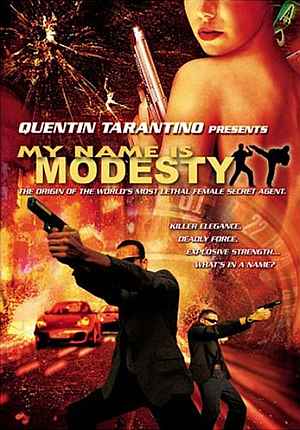 The word is, Miramax made this in order to keep their rights to the Modesty Blaise series active: I imagine a clause reverted them back to creator Peter O’Donnell, if unused within X years. Tarantino wanted to direct it, but couldn’t find the time, hence this stop-gap directed by journeyman Spiegel, who’s familiar with Quentin cast-offs, having also directed From Dusk Till Dawn 2. Shot in 18 Romanian days, the limitations of time and budget are clear [save admittedly copious flashbacks, the movie is almost all set in one location], but given them, it’s by no means a disaster. The main failing is the lack of action; we don’t see alleged jet-setting, goddess of kick-butt Blaise do much at all until the last few minutes. This may be because Staden looks as if she’d struggle to move forward in a stiff breeze; seeing her trading blows is unconvincing, and the fight choreographer should have focused on speed and/or agility instead. Though in terms of presence and steely gaze, she does fit the part well.
The word is, Miramax made this in order to keep their rights to the Modesty Blaise series active: I imagine a clause reverted them back to creator Peter O’Donnell, if unused within X years. Tarantino wanted to direct it, but couldn’t find the time, hence this stop-gap directed by journeyman Spiegel, who’s familiar with Quentin cast-offs, having also directed From Dusk Till Dawn 2. Shot in 18 Romanian days, the limitations of time and budget are clear [save admittedly copious flashbacks, the movie is almost all set in one location], but given them, it’s by no means a disaster. The main failing is the lack of action; we don’t see alleged jet-setting, goddess of kick-butt Blaise do much at all until the last few minutes. This may be because Staden looks as if she’d struggle to move forward in a stiff breeze; seeing her trading blows is unconvincing, and the fight choreographer should have focused on speed and/or agility instead. Though in terms of presence and steely gaze, she does fit the part well.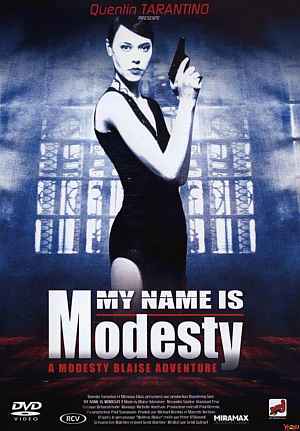 I remember the books from my youth, and the huge disappointment I felt when I saw the 1966 camp abortion starring Monica Vitti [there was also an 1982 TV pilot, with Ann Turkel, which I haven’t found]. This “origin” story is an improvement, at least taking the characters seriously. Blaise is trapped in a casino by a robber with a grudge against the owner (Waldau), and as they wait for the guy with the safe combination to arrive, she trades stories of her past for the freedom of the other hostages, Arabian Nights style, almost. I’d be somewhat curious to see the original cut, which apparently ran nearly two hours. Now, it’s barely 70 minutes between Bond-esque opening and closing credits, yet is still pretty talky, Blaise and her mentor (Pearson) meandering between the Balkans and Morocco.
I remember the books from my youth, and the huge disappointment I felt when I saw the 1966 camp abortion starring Monica Vitti [there was also an 1982 TV pilot, with Ann Turkel, which I haven’t found]. This “origin” story is an improvement, at least taking the characters seriously. Blaise is trapped in a casino by a robber with a grudge against the owner (Waldau), and as they wait for the guy with the safe combination to arrive, she trades stories of her past for the freedom of the other hostages, Arabian Nights style, almost. I’d be somewhat curious to see the original cut, which apparently ran nearly two hours. Now, it’s barely 70 minutes between Bond-esque opening and closing credits, yet is still pretty talky, Blaise and her mentor (Pearson) meandering between the Balkans and Morocco. There’s certainly plenty of potential in the idea: how do you break up with your girlfriend, when she’s not just needy and possessive, but also has superhuman strength, the ability to fly and can boil your fishtank with her gaze? And the casting is, in general, excellent, too. Matt (Wilson) is an endearing everyman, and Thurman is perfect for capturing the mix of neuroses and power in G-Girl – her sequence where she pouts and refuses to save New York from a rogue missile is great. Izzard, naturally, steals almost every scene as supervillain Professor Bedlam [or “Barry”, as G-Girl knows him], though Riann Wilson matches him as Matt’s best friend, who talks a far better sexual game than he actually plays.
There’s certainly plenty of potential in the idea: how do you break up with your girlfriend, when she’s not just needy and possessive, but also has superhuman strength, the ability to fly and can boil your fishtank with her gaze? And the casting is, in general, excellent, too. Matt (Wilson) is an endearing everyman, and Thurman is perfect for capturing the mix of neuroses and power in G-Girl – her sequence where she pouts and refuses to save New York from a rogue missile is great. Izzard, naturally, steals almost every scene as supervillain Professor Bedlam [or “Barry”, as G-Girl knows him], though Riann Wilson matches him as Matt’s best friend, who talks a far better sexual game than he actually plays.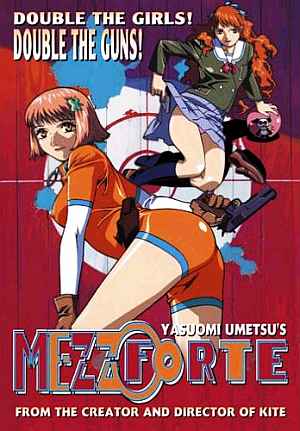 The Peach Twisters baseball team suck. This may be because the owner kills his pitcher with a baseball bat in the car-park, after losing a game? And he’s the model of restraint and sanity compared to his daughter, Momomi. The Danger Service Agency, a trio of troubleshooters, are hired to kidnap the owner (obviously, legality is a minor concern), but things go wrong, and he dies in the process. How can they escape this tricky situation? The core of the DSA is Mikura, who is a combat specialist, and easily the best thing in the group, as the other two are largely forgettable. But when Mikura goes into action, the film accelerates from 0-60 in about two seconds, which a cheerful, splattery approach that’s endearing. And she’s an upbeat character, which is a notable contrast to Umetsu’s other genre entry, Kite [Sawa, that show’s heroine, makes a cameo here].
The Peach Twisters baseball team suck. This may be because the owner kills his pitcher with a baseball bat in the car-park, after losing a game? And he’s the model of restraint and sanity compared to his daughter, Momomi. The Danger Service Agency, a trio of troubleshooters, are hired to kidnap the owner (obviously, legality is a minor concern), but things go wrong, and he dies in the process. How can they escape this tricky situation? The core of the DSA is Mikura, who is a combat specialist, and easily the best thing in the group, as the other two are largely forgettable. But when Mikura goes into action, the film accelerates from 0-60 in about two seconds, which a cheerful, splattery approach that’s endearing. And she’s an upbeat character, which is a notable contrast to Umetsu’s other genre entry, Kite [Sawa, that show’s heroine, makes a cameo here].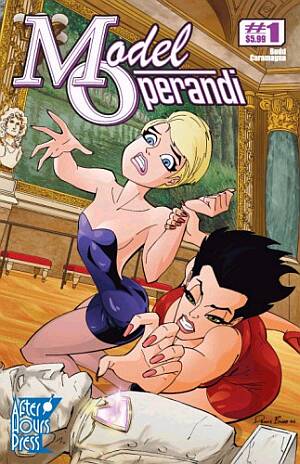
 The problem with boxing films is that it’s very hard to avoid the obvious cliches. Kid from the streets, initially seen as hopeless, eventually convinces a trainer to take them on, and struggles towards the goal of a shot at the big time. Million is no different, for the first two-thirds at least. Then, there is a sudden, unexpected swerve – or would have been unexpected, if our son hadn’t ruthlessly spoilered it, by wandering in and telling us of a scene in Scary Movie 4 which spoofed it. Thank you, Robert. :-) This shifts the movie in a radically different direction, though also divorcing it entirely from the action heroine genre and robbing it of at least half a grade, since reviews here center around such aspects.
The problem with boxing films is that it’s very hard to avoid the obvious cliches. Kid from the streets, initially seen as hopeless, eventually convinces a trainer to take them on, and struggles towards the goal of a shot at the big time. Million is no different, for the first two-thirds at least. Then, there is a sudden, unexpected swerve – or would have been unexpected, if our son hadn’t ruthlessly spoilered it, by wandering in and telling us of a scene in Scary Movie 4 which spoofed it. Thank you, Robert. :-) This shifts the movie in a radically different direction, though also divorcing it entirely from the action heroine genre and robbing it of at least half a grade, since reviews here center around such aspects. Just imagine Jennifer Aniston watching this film: every time Ange appears on the screen, or gazes lovingly at Brad, Jen shrieks maniacally, “Die, sluuuuuut!” Such thoughts will keep you entertained during the sluggish first hour – you’ll need them, while you wait for the characters to realise what we know from the start: Mr. and Mrs. Smith are both assassins, now targeted by their respective agencies. For
Just imagine Jennifer Aniston watching this film: every time Ange appears on the screen, or gazes lovingly at Brad, Jen shrieks maniacally, “Die, sluuuuuut!” Such thoughts will keep you entertained during the sluggish first hour – you’ll need them, while you wait for the characters to realise what we know from the start: Mr. and Mrs. Smith are both assassins, now targeted by their respective agencies. For  We don’t know whether the Smiths are “good”, “bad” or independent contractors, an interesting approach (we have no moral compass beyond their actions), yet disappointing. For another weakness is that the villains are merely faceless minions, when the genre needs a Big Bad for the climax – the obvious one here is the people that ordered the terminations. Liman, whose Bourne Identity was also about a killer with a contract on his head, might appreciate this more than most, and word is two such endings were shot, just not used. Still, I suspect that the sequel – likely inevitable, given this was one of 2005’s top ten at the US box-office – could very well be more fun than the original. At least we’ll have all the tedious set-up out of the way.
We don’t know whether the Smiths are “good”, “bad” or independent contractors, an interesting approach (we have no moral compass beyond their actions), yet disappointing. For another weakness is that the villains are merely faceless minions, when the genre needs a Big Bad for the climax – the obvious one here is the people that ordered the terminations. Liman, whose Bourne Identity was also about a killer with a contract on his head, might appreciate this more than most, and word is two such endings were shot, just not used. Still, I suspect that the sequel – likely inevitable, given this was one of 2005’s top ten at the US box-office – could very well be more fun than the original. At least we’ll have all the tedious set-up out of the way.